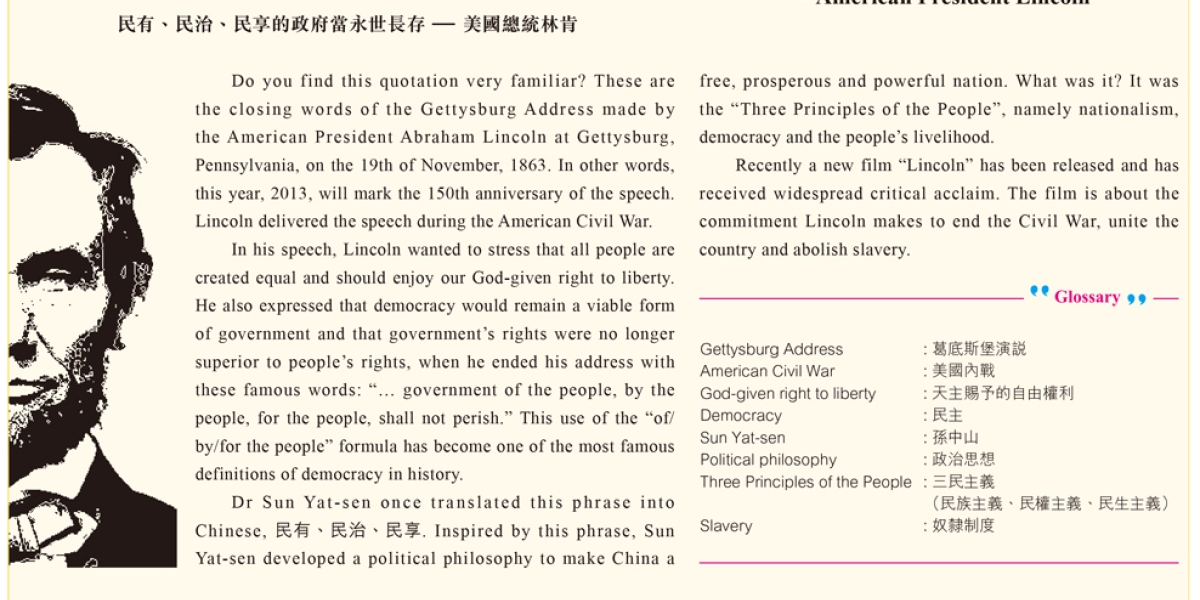昔日文章


Neither East Nor West
2013.09.29
Truth
This year, the subject for my 11th grade students is on the moral teachings of the Catholic Church.
We begin with Truth.
I try to keep it simple, to lay a foundation for training in rational and philosophical thinking, certainly not thorough enough for in-depth study of philosophy.
Pontius Pilate said to Jesus, “Truth? What is it?”
To philosophers throughout history, that is the most basic question. Is there a Truth that is above and beyond our own experience that we want to discover?
In class, I begin with two terms:
Objective Truth. Truth as it is, regardless of our thinking about it.
Subjective truth. Truth as I come to know it.
Are they the same? Is it possible that what I learn is actually different from what it really is?
One example I use is n0. Everyone knows that it is 1 except when n = 0. Well, not everyone. Even though it is merely the mathematical way of writing a number divided by itself (n/n), some do not know it. It does not look right. It looks funny. What could it be? For those who do not know the answer, most would guess 0.
But can anyone prove it mathematically? Not everyone.
And if you cannot show it mathematically, is it still true? Of course.
So in our lives, many things we have learned subjectively to be true need to be verified to be objectively true. But not everything can be verified. That is where faith comes in. And we will look at that later. It suffices to say that in our day and age many people make the mistake of thinking that truth is only those ideas we can prove. And those things we cannot prove, like God, they must not be true or real. That is really very arrogant.
Once I was flying to Chicago and seated next to me was a lady who claimed to be an atheist and an existentialist. (Funny conversations go on when a priest travels in his clerics, uniform.) She told me that she could not believe what she had not experienced herself. So I asked her whether there were any Chinese on the other side of the world. She looked me in the eye and told me that for all she cares, on the other side of the world no Chinese, not 1 billion of them, exists. I then asked her if it made any difference that I came from there. She had no answer. So for all of you who live in Hong Kong and have never left, the United States does not exist and neither do I.
All you who live in Hong Kong exist regardless of this lady’s thinking or experience.
I try to tell my students, all teenagers, that they are at a stage in life that they begin to question everything. It is normal. They are just beginning to learn to ask the more difficult questions. Many adults think that it is because they are of the age of rebellion. I disagree with them. It is important that young people learn to verify what is true. It is not about mistrusting. This stage of maturity may seem confusing and argumentative. It begins with questioning about everything and learning how to find answers. This is a difficult process, but a most necessary one. And there are no short cuts. Each person goes about it at his or her own pace. There is no time frame, either. The adults in their lives cannot be impatient or suspicious.
Do not be afraid. It is the beginning of a beautiful journey.


Famous Quotations
2013.05.05
Music is a higher revelation than all wisdom and philosophy. — Ludwig van Beethoven 音樂的啟示高於一切智慧和哲理。──路德維希.范.貝多芬
Even if you don’t play the piano, you will still have heard of the name and the music of the talented classical music composer Ludwig van Beethoven. To many people, music is an essential part of their life. What kind of music do you like? What can music give you? Music has a special power to change our mood, and even help u s c o n c e n t r a t e . I n B e e t h o v e n ’s v iew, m u s i c c o u l d g i v e him i n s p i r a t i o n and motivation that were greater than human wisdom or philosophy.
Beethoven (1770 - 1827) was born in Germany. He showed his mus ical talents at an early age and his first piano i n s t r u c t o r was h i s father. When he was nine years old, he began to learn from a court organist. Later, he moved to Vienna, and started to learn the violin and studied under the famous composer Joseph Haydn.
By his twenties, he began to lose his hearing. Despite his hearing problem, he continued to compose music. Many of his important works, including “The Ninth Symphony” (《第九交響曲》), were composed during this period.
Beethoven composed symphonies, concertos for piano, piano sonatas, string quartets, and chamber music. Can you name a few famous ones? They include “The Fifth Symphony”, “Moonlight Sonata” (《月光奏鳴曲》), and “Für Elise” (《給愛麗絲》).
Beethoven is considered as the predominant figure in the transitional period between the Classical and Romantic eras in Western classical music. He still remains one of the most influential figures in the history of music.
Glossary
Classical music composer: 古典音樂作曲家
Piano instructor: 鋼琴導師
Court organist: 宮廷風琴手
Concertos: 協奏曲
String quartets: 弦樂四重奏
Chamber music: 室內樂
Classical era: 古典主義時期
Romantic era: 浪漫主義時期


Famous Quotations
2013.03.17
Is it not a pleasure to study and practise from time to time? — Confucius | 學而時習之,不亦說乎? – 孔子
A lot of you might know Confucius already. Confucius (551-479 BC) was a great thinker, educator, politician and philosopher in the Spring and Autumn Period of Chinese history. Confucius is the Latinized name of Kung Fu-tzu (孔夫子, or “Master Kung” in English).
Do you know which book the above quotation is taken from? The book is called “Analects” (《論語》), which is a collect ion of Confucius’ sayings and ideas compiled by his students. As a teacher, Confucius emphasized studying and thinking on what one has learned. His goal was to educate gentlemen who love learning, righteousness, and humaneness. He believed that gentlemen of virtue must set the moral example for others in society.
What is the second half of the above quotation? It is:
“Is it not delightful to have friends coming from distant places? If a man remains not annoyed when he is not understood by other people, is he not a man of virtue?” (有朋自遠方來,不亦樂乎?人不知而不愠,不亦君子乎?)
Confucius is also known as the “Great Sage” and the “Model Teacher of Ten Thousand Generations” for his important contribution to the history of culture and of teaching in China. His philosophy has become what we call “Confucianism” nowadays, which has deeply influenced the civilization of not just China, but also Korea and Japan.
The works of Confucius were first brought to the West by Matteo Ricci (利瑪竇), a Jesuit priest, in the early 17th century, and started to influence European thinkers of the period.
----------------------------------------------------------------------------------
Spring and Autumn Period: 春秋時代
Latinized: 拉丁化
Righteousness: 義
Humaneness: 仁
Great Sage: 至聖
Model Teacher of
Ten Thousand Generations: 萬世師表
Confucianism: 儒家
Jesuit priest: 耶穌會神父


Famous Quotations
2013.02.24
government of the people, by the people, for the people, shall not perish from the earth – American President Lincoln 民有、民治、民享的政府當永世長存 – 美國總統林肯
government of the people, by the people, for the people, shall not perish from the earth
– American President Lincoln
民有、民治、民享的政府當永世長存 – 美國總統林肯
Do you find this quotation very familiar? These are the closing words of the Gettysburg Address made by the American President Abraham Lincoln at Gettysburg, Pennsylvania, on the 19th of November, 1863. In other words, this year, 2013, will mark the 150th anniversary of the speech. Lincoln delivered the speech during the American Civil War.
In his speech, Lincoln wanted to stress that all people are created equal and should enjoy our God-given right to liberty. He also expressed that democracy would remain a viable form of government and that government’s rights were no longer superior to people’s rights, when he ended his address with these famous words: “… government of the people, by the people, for the people, shall not perish.” This use of the “of/ by/for the people” formula has become one of the most famous definitions of democracy in history.
Dr Sun Ya t - s e n once t r a n s l a t e d t h i s phrase i n t o Chinese, 民有、民治、民享. Inspired by this phrase, Sun Yat-sen developed a political philosophy to make China a free, prosperous and powerful nation. What was it? It was the “Three Principles of the People”, namely nationalism, democracy and the people’s livelihood.
Recently a new film “Lincoln” has been released and has received widespread critical acclaim. The film is about the commitment Lincoln makes to end the Civil War, unite the country and abolish slavery.
Gettysburg Address : 葛底斯堡演說
American Civil War : 美國內戰
God-given right to liberty : 天主賜予的自由權利
Democracy : 民主
Sun Yat-sen : 孫中山
Political philosophy : 政治思想
Three Principles of the People : 三民主義
(民族主義、民權主義、民生主義)
Slavery : 奴隸制度


